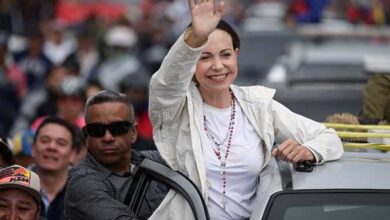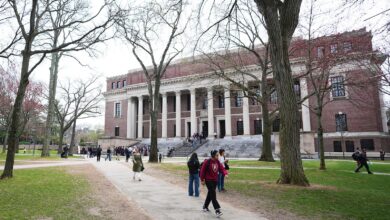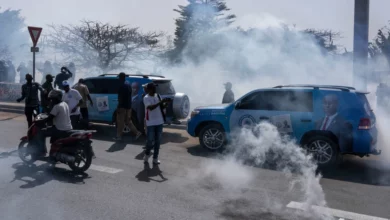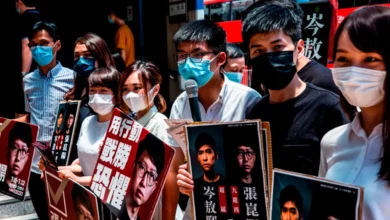Leaders of liberal political parties from across the globe gathered in Cairo over the weekend to stress that Islam and liberalism are not mutually exclusive and to call for resolving conflicts between the West and Muslim countries on the basis of dialogue.
“We believe in building relations and encouraging peoples to change the world we live in through political dialogue,” said John Lord Alderdice, the President of the Liberal International (LI), an umbrella of more than 100 liberal political parties and organizations around the world.
Alderdice, a British Liberal Democrat member, added in his opening remarks before the 56th Congress of the Liberal International that liberal political systems cannot be imposed by external powers.
“Liberals must develop their liberal principles according to their contexts. Liberalism should have different colorings and different flavors,” explained Alderdice who had been leading the 61-year-old federation for the past eight years.
The LI’s congress, the third in a Muslim country since 2003, was held in a time where Islamic-Western relations are still recovering from the setbacks caused by the 9/11 attacks and the US wars on Afghanistan and Iraq.
“We understand perfectly the implications of holding this congress in Egypt during a time of mutual misunderstanding between the Muslim world and the West,” said Osama el-Ghazali Harb, head of the Democratic Front Party, Egypt’s newest liberal parties and host of the congress.
Harb added that liberalism provides the intellectual and theoretical framework to avoid wars and bloody confrontations, a point which was also emphasized by Alderdice who expressed concerns that “security measures” rather than dialogue have become the focus of Western-Muslim relations.
Aside from accepting a dinner invitation by former presidential candidate and founder of Al-Ghad Party Ayman Nour who spent four years in jail for what is widely believed as a politically motivated sentence, delegates of Liberal International paid only lip service to notions of democracy and political reform in the Middle East.
Distancing themselves from the once highly controversial project of pressuring Arab states to reform its political structures through elections’ ballots, leaders of European liberal parties opted for a rather gradual political transformation.
“Democracy is not about elections, even if they are fair and free. It is about the rule of law, and respecting the outcomes of elections,” said Alderdice.
“We expressed solidarity with opposition voices in the Arab world,” said a Scandinavian participant. “However, our initial objective is to engage the region’s governments into debate rather than making them hostile,” the politician told Al-Masry Al-Youm English Edition on condition of anonymity.
High ranking Egyptian officials seemed pleased by the calls of dialogue.
“Liberal values are based on the importance of dialogue and embracing and respecting ‘the other’, regardless of his cultural, religious and intellectual background,” said Mofid Shehab, Egyptian Minister of Legal and Parliamentary Councils, in his opening speech before the congress.
Shehab added that Liberalism, which he defined as a culturally-specific notion, is the venue whereby “the calls for hatred and the clash of civilizations could be confronted.”
The Egyptian minister also reminded the audience that his government has been determined to push for democracy and political reform “despite the [current] hard times of extremism and narrow-mindedness.”
Opposing democracy and the rule of law on the ground that they are Western concepts were strongly dismissed by some participants.
“I consider it an insult that some Western scholars and Muslim autocrats argue that Islam and democracy are inherently incompatible,” said Anwar Ibrahim, leader of the opposition and former Deputy Prime Minister of Malaysia.
Ibrahim added that while Arabs and Muslims have been outraged by US guards beating and torturing Iraqi detainees in Abu Gharib Prison in 2004, a similar attention must be given to abuses in prisons and detention centers in the Muslim world.
“We must condemn the excesses in our own backyards,” said Ibrahim who himself was sentenced to jail for nine years in 2000 for alleged sodomy, a charge many observers think it was intended to tarnish his reputation.
The Malaysian politician strongly dismissed perpetuating dictatorship in the Muslim world on the premise that elections ballots might bring in the fundamentalists.
“In Indonesia, the government allowed all parties to participate, even the extremists, but voters elected a moderate leader,” Ibrahim was referring to last July presidential elections when President Susilo Bambang Yudhoyono’s secular Democratic Party managed to secure a landslide victory.
“There is only one form of democracy,” said Ismail Jussa, chairman of the Civic United Front in Tanzania, rendering the notion of “African democracy” as a disguise for sustaining authoritarian structures.




